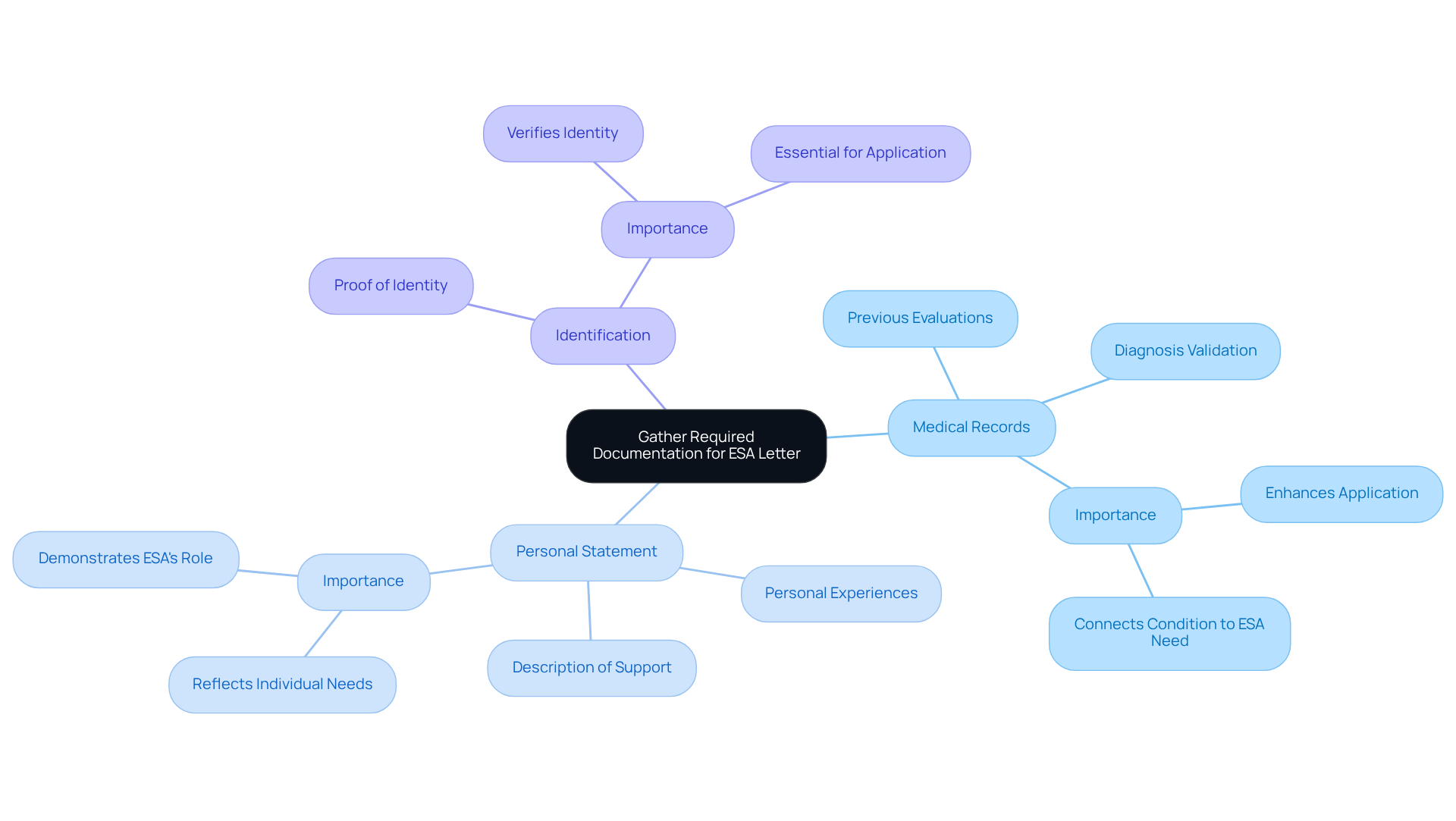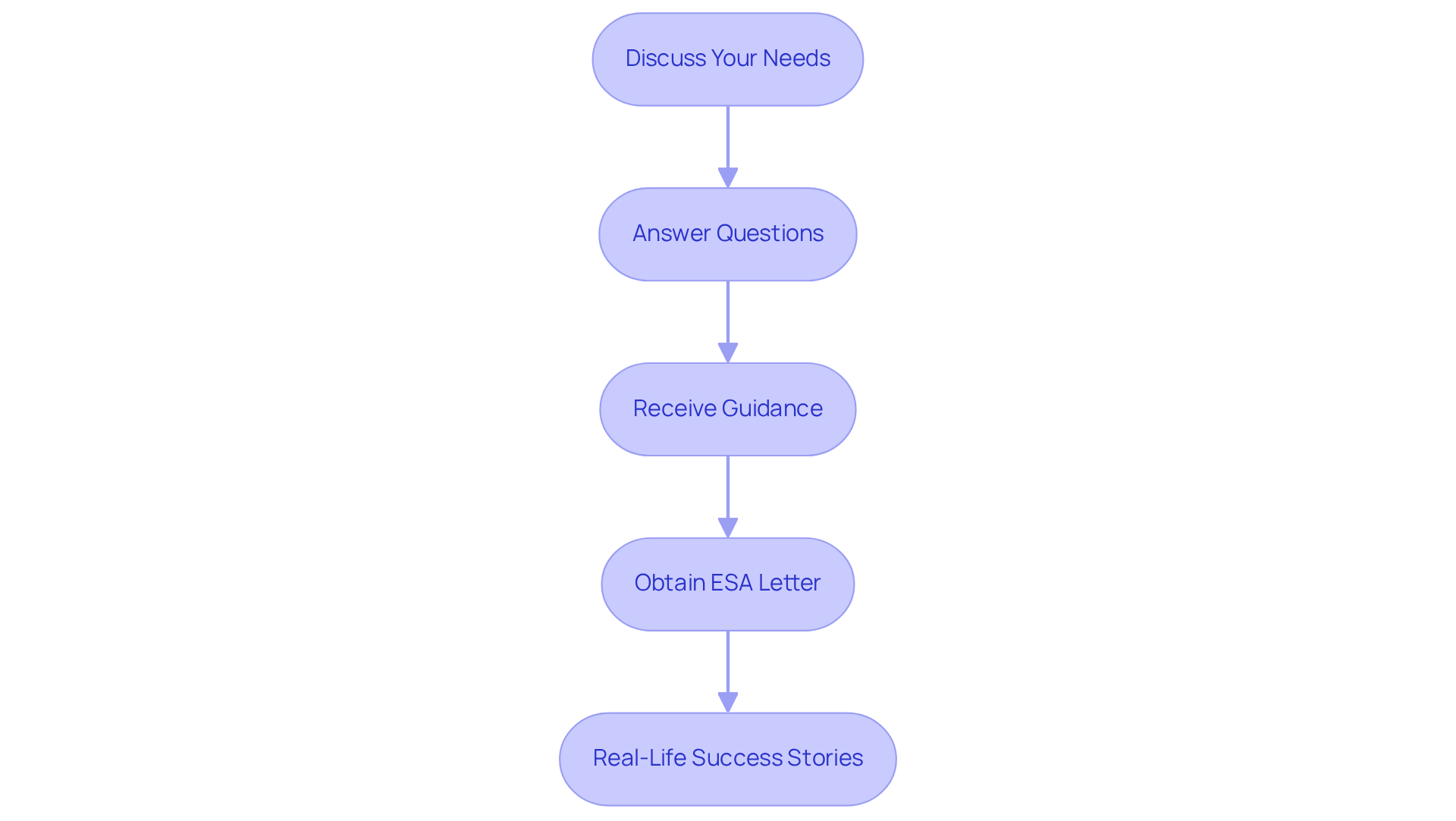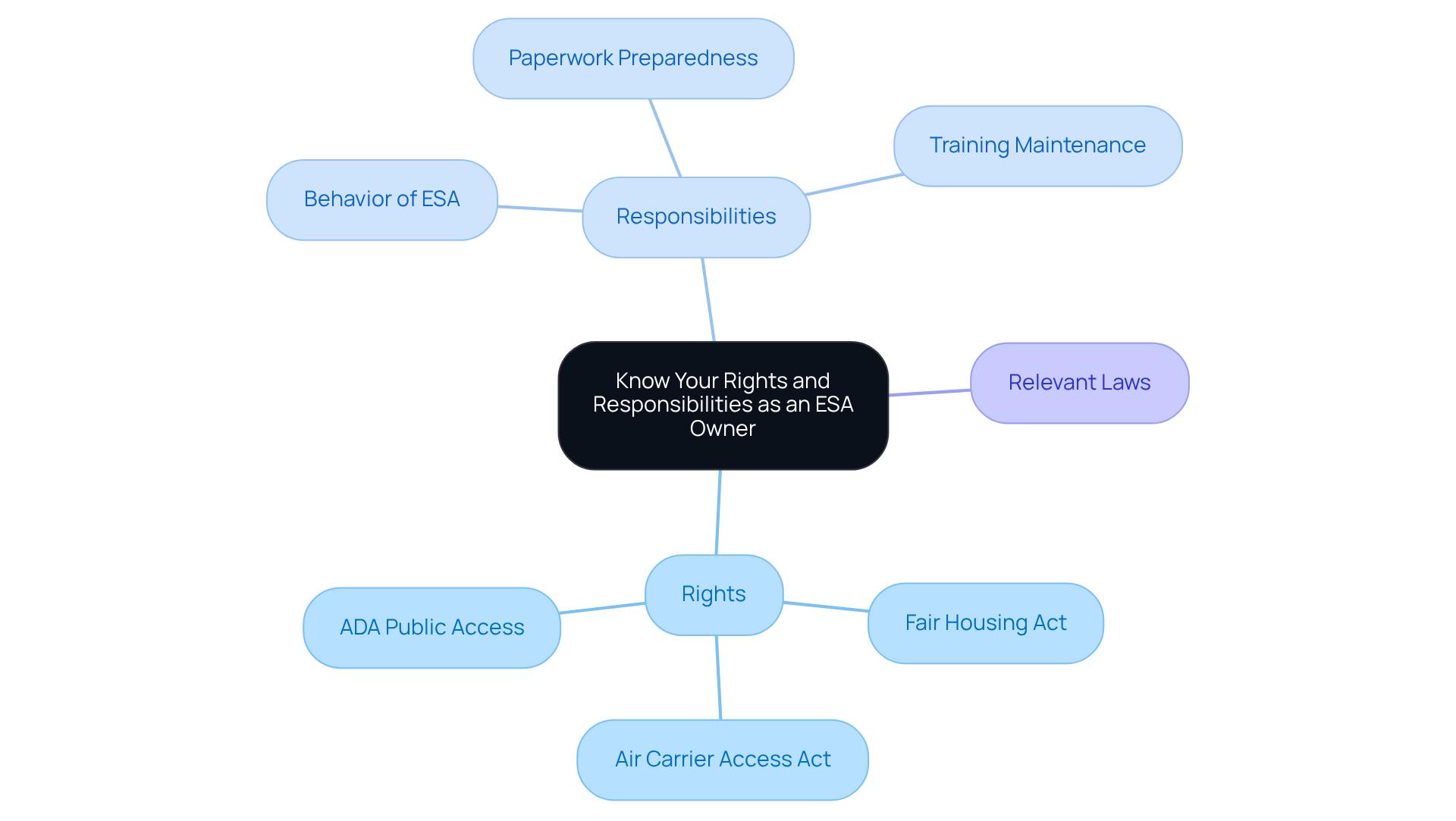

4 Steps for Emotional Support Dog Paperwork Success
by Lena Park
Last updated: July 10, 2025
Verified and Approved by:
Angela Morris,
MSW, LCSW
Fact Checked

Overview
This article seeks to guide you through the important steps for obtaining emotional support dog paperwork, recognizing the emotional challenges you may face along the way. It highlights the significance of thorough preparation—gathering the necessary documentation and consulting with licensed professionals. This preparation is not just a formality; it is essential for navigating the process and ensuring you receive the legal recognition needed to enjoy the comforting companionship of your emotional support animal. Remember, you are not alone in this journey, and with the right support, you can find the relief and companionship you deserve.
Introduction
Emotional support dogs are invaluable companions for those navigating the complexities of mental health challenges, providing a source of comfort that can profoundly improve overall well-being. Yet, the journey to obtaining the necessary documentation to legally recognize these cherished animals can feel overwhelming.
This guide aims to simplify the essential steps needed to secure emotional support dog documentation, empowering you to assert your rights and access the healing benefits your pet offers.
What hurdles might you encounter along the way, and how can you effectively navigate them to ensure your emotional support dog receives the recognition and support it deserves?
Understand the Role of Emotional Support Dogs
Emotional assistance animals are vital companions for those navigating the challenges of mental health issues, such as anxiety, depression, and PTSD. Unlike service animals, which are specially trained to assist individuals with disabilities, therapy canines offer therapeutic benefits simply through their presence. They help alleviate feelings of loneliness, lower anxiety levels, and foster a sense of security. Have you ever noticed how the mere presence of a pet can bring comfort? Research shows that 69% of pet parents report their pets significantly reduce stress and anxiety, while 74% of pet owners believe their mental health improved after welcoming a pet into their lives. This underscores the importance of therapy animals in enhancing mental well-being.
The legal acknowledgment of therapy animals through emotional support dog paperwork is crucial, as it allows individuals to secure housing and travel arrangements that might otherwise restrict pet ownership due to mental health challenges. For many, especially those with PTSD, the companionship of therapy animals can offer profound relief, alleviating symptoms and enhancing overall quality of life. Mental health experts emphasize that comfort animals play an essential role in providing solace and companionship, often leading to significant improvements in mental health indicators.
Wellness Wag offers a streamlined online platform for obtaining emotional support dog paperwork, ensuring a hassle-free experience for clients. Testimonials from satisfied customers highlight the effortless process of securing emotional support dog paperwork, which reinforces the effectiveness of Wellness Wag’s services. For those seeking guidance, Wellness Wag provides a state-specific guide to help navigate the process of obtaining emotional support dog paperwork tailored to individual needs. In conclusion, therapy dogs not only provide companionship but also serve as a lifeline for many, assisting in reducing anxiety and depression. Obtaining emotional support dog paperwork through Wellness Wag is a crucial step for individuals seeking the therapeutic benefits of their pets.
Gather Required Documentation for ESA Letter
Before requesting an ESA letter, it’s important to gather the necessary emotional support dog paperwork to support your application. This preparation can make a significant difference in your journey towards emotional well-being. Typically, you will need to collect the following:
-
Medical Records: Previous mental health evaluations or diagnoses that validate your need for an emotional support animal. Licensed professionals emphasize that having comprehensive medical records can greatly enhance your emotional support dog paperwork, as they clearly connect your mental health condition to the necessity of having an ESA.
-
Personal Statement: A heartfelt description of how your therapy dog will assist you in managing your mental health condition. This statement should reflect your personal experiences and the specific ways in which your animal contributes to your emotional well-being.
-
Identification: Proof of identity, such as a driver’s license or passport, is essential to verify your identity during the application process.
By preparing the emotional support dog paperwork in advance, you not only streamline your consultation with a licensed professional but also ensure that your application is complete and accurate. It’s crucial to note that around 30% of ESA letter applications are denied due to incomplete documentation. Therefore, thorough preparation is vital for success. Additionally, keep in mind that ESA letters are typically valid for one year and must be signed by a licensed mental health professional on official letterhead to be considered valid. This process is essential for securing access to housing and support, allowing individuals to fully embrace their residential life with the comfort of their therapy animals. Remember, you are not alone in this journey; the support you seek is within reach.

Consult with Licensed Professionals for ESA Approval
Consulting with a licensed mental health professional is a vital step in obtaining an Emotional Support Animal (ESA) letter. This expert—be it a psychologist, psychiatrist, or licensed therapist—understands the therapeutic role of assistance animals. During your consultation, you can anticipate the following:
- Discuss Your Needs: It’s important to be open about your mental health challenges, such as anxiety, depression, or PTSD. Share how an emotional support dog can help you navigate these difficulties.
- Answer Questions: The professional will likely pose specific questions to better understand your situation. These may address your daily life, the nature of your mental health condition, and how an ESA might provide support. This understanding is crucial in determining if an ESA is right for you.
- Receive Guidance: Following the assessment, the mental health professional will offer tailored recommendations. If they conclude that an ESA is appropriate, they will provide emotional support dog paperwork that meets legal requirements, which is essential for securing housing and travel arrangements that accommodate assistance animals.
Real-life examples underscore the effectiveness of this process. For instance, a 43-year-old woman with anxiety successfully obtained an ESA letter for her Labrador retriever mix after discussing her fear of flying and the hurdles she faced in attending therapy due to her work commitments. This consultation not only equipped her with the necessary documentation but also made it possible for her to travel with her pet, significantly enhancing her quality of life.
Success rates for obtaining ESA letters after consultations with licensed professionals are notably high, particularly when clients are honest about their needs and the role their animals play. Wellness Wag, for example, has supported over 50,000 patients, reflecting a dedication to assisting individuals in navigating the complexities of emotional support dog paperwork. By following this structured approach, you can increase your chances of obtaining the support you need through your therapy dog.

Know Your Rights and Responsibilities as an ESA Owner
As an emotional support animal owner, it’s essential to recognize both your rights and responsibilities in a nurturing way.
Many individuals face emotional challenges that can feel overwhelming. It’s important to know that under the Fair Housing Act, you have the right to live with your emotional support dog in housing that might otherwise prohibit pets. This right can be a source of comfort and stability. Similarly, the Air Carrier Access Act allows you to travel with your ESA on airlines that accommodate emotional support animals, making it easier to keep your support close during times of need. While service animals are not required to be certified or registered, obtaining certification can lend credibility and ensure that your service animal meets specific training standards. Service animal owners enjoy full public access rights under the Americans with Disabilities Act (ADA), allowing them to bring their service animals into public spaces, including restaurants and stores, which can be reassuring in social situations.
With these rights come important responsibilities. You must ensure that your ESA is well-behaved and does not pose a threat to others, as this is vital for maintaining your rights. Additionally, being prepared to provide your emotional support dog paperwork when requested by landlords or airline personnel is crucial. For service dog owners, maintaining the training and behavior of their service dogs is equally important to uphold their rights and ensure a positive experience for everyone involved.
Being informed about these rights and responsibilities can empower you to navigate any challenges that arise. Remember, having your emotional support dog by your side can be a source of comfort and companionship, helping you face the world with greater confidence.

Conclusion
Emotional support dogs play a vital role in enhancing the quality of life for individuals facing mental health challenges. By acknowledging the significance of these animals, gathering the necessary documentation, consulting with licensed professionals, and understanding one’s rights and responsibilities, individuals can navigate the process of obtaining emotional support dog paperwork with greater ease. This journey not only affirms the bond between humans and their therapy animals but also opens doors to essential legal protections and support systems.
The article outlines four fundamental steps:
- Recognizing the therapeutic benefits of emotional support dogs
- Preparing required documentation such as medical records and personal statements
- Consulting with mental health professionals for ESA approval
- Understanding the rights and responsibilities that come with being an ESA owner
Each step is designed to facilitate a smoother process, ensuring individuals can access the emotional support they need while remaining informed about their legal rights.
Ultimately, the message is clear: obtaining emotional support dog paperwork is not merely a bureaucratic hurdle but a crucial step toward improving mental health and well-being. As our understanding of the role of emotional support animals continues to grow, so too does the opportunity for individuals to embrace the comfort and companionship these animals provide. Taking action now can lead to a more fulfilling life, supported by the unconditional love of an emotional support dog.
Frequently Asked Questions
What is the role of emotional support dogs?
Emotional support dogs are vital companions that help individuals navigate mental health challenges such as anxiety, depression, and PTSD by providing therapeutic benefits through their presence.
How do emotional support dogs differ from service animals?
Unlike service animals, which are specially trained to assist individuals with disabilities, emotional support dogs offer comfort and companionship without specific training to perform tasks.
What benefits do therapy dogs provide?
Therapy dogs help alleviate feelings of loneliness, lower anxiety levels, and foster a sense of security, significantly improving mental well-being.
What do statistics say about the impact of pets on mental health?
Research shows that 69% of pet parents report their pets significantly reduce stress and anxiety, while 74% believe their mental health improved after welcoming a pet into their lives.
Why is emotional support dog paperwork important?
Emotional support dog paperwork is crucial for securing housing and travel arrangements that might otherwise restrict pet ownership due to mental health challenges.
How do therapy animals assist individuals with PTSD?
For many individuals with PTSD, the companionship of therapy animals offers profound relief, alleviating symptoms and enhancing overall quality of life.
What services does Wellness Wag provide?
Wellness Wag offers a streamlined online platform for obtaining emotional support dog paperwork, ensuring a hassle-free experience for clients, along with a state-specific guide for navigating the process.
What do customer testimonials say about Wellness Wag’s services?
Testimonials from satisfied customers highlight the effortless process of securing emotional support dog paperwork through Wellness Wag, reinforcing the effectiveness of their services.
How do therapy dogs contribute to mental health improvement?
Mental health experts emphasize that therapy dogs provide solace and companionship, often leading to significant improvements in mental health indicators, including reductions in anxiety and depression.
Certify Your Emotional Support Animal Today

Why You Can Rely on Us?
At Wellness Wag, we believe your pet deserves care rooted in both science and compassion. Each article is carefully researched, written in clear language for pet owners, and then reviewed by qualified professionals to ensure the information is evidence-based, current, and practical for real-life care. Our goal is to help you feel confident in making informed decisions about your pet’s health and well-being.
Reviewed by
Angela Morris, MSW, LCSW
Angela is a licensed clinical social worker with 20 years of experience in patient advocacy and community mental health. She has assisted numerous clients with ESA evaluations and brings a deep understanding of disability accommodations, ensuring that all information is accurate, supportive, and practical.

Written by :
Lena Park
Last Updated :
July 10, 2025












